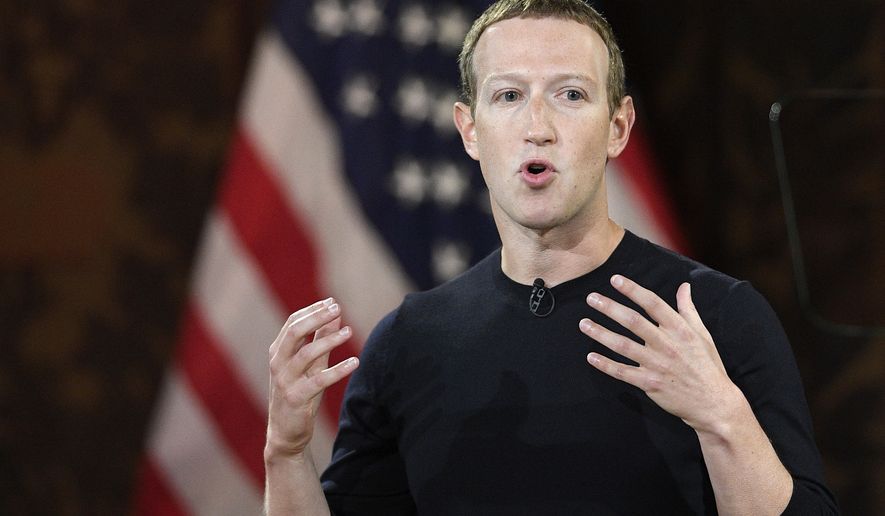Conservatives who long have favored limited government are becoming increasingly divided over a federal crackdown on Big Tech.
On one side are right-leaning groups that think companies such as Facebook, Amazon and Google are biased against conservatives and have grown too big. On the other are the more libertarian organizations who say the push to break up Big Tech runs against traditional conservative values of limited government and individual freedoms.
Conservatives “feel and believe that tech leadership hates them and hates their views,” said Rachel Bovard, senior adviser to the Internet Accountability Project, a right-leaning advocacy group formed last month that is pushing for the government to take on Big Tech. She said the group is also motivated by antitrust issues.
“Our role is to actually have these conversations on the right,” said Ms. Bovard, former legislative director for Sen. Rand Paul, Kentucky Republican. “The pushback comes from the more libertarian corners of the Republican Party.”
Sen. Josh Hawley, Missouri Republican, introduced legislation this summer that would outlaw the “addictive” features employed by social media companies such as autoplay and infinite scroll, and he has recently gained new allies in the form of the Internet Accountability Project.
The group, founded by Mike Davis, a former chief counsel to Iowa Sen. Charles E. Grassley, is partnering with conservative organizations such as the Tea Party Patriots and the Conservative Partnership Institute, a think tank led by former Sen. Jim DeMint.
But the push for government intervention runs counter to traditional conservative values, said Daisy Soderberg-Rivkin, a resident fellow on the policy team at the libertarian R Street Institute.
Ms. Soderberg-Rivkin, a former content moderator at Google, said the “split [on the right] essentially comes from a misunderstanding of technology.”
“We scarcely had time to sit there and twiddle our thumbs and say we were going to shut up all the conservatives that were coming through,” Ms. Soderberg-Rivkin said. “To say that there is some kind of conspiracy in Google or any of these tech companies to dismantle the conservatives, you [would be] really on another planet.”
The Internet Accountability Project, however, portrays the leaders of Big Tech as the 21st century reincarnation of the robber barons who should spawn an “antitrust revival.”
“We are living in a new Gilded Age, only this time the Robber Barons wear hoodies and live in Silicon Valley,” the group writes on its website. “Today, Swamp Conservatives who leap to Big Tech’s defense are mostly taking Big Money from Big Tech. They may call themselves Conservatives but their paychecks are coming from Silicon Valley.”
Facebook founder Mark Zuckerberg did not sport a hoodie at Georgetown University Thursday when he delivered remarks dismissing allegations of political bias at Facebook. He did endorse the view that the government needs to create new rules affecting his company’s operations.
“My view is that for each of the specific issues that come up, there are things that the platform[s] have a role in and things that the government has a role in,” Mr. Zuckerberg said. “We need to do our part to address the issues, we need to work with government to actually put in place rules on the real issues, and if that happens, then I basically don’t think that people will end up concluding that breaking up the [tech] companies is the right thing to do.”
Mr. Zuckerberg is scheduled to testify next week before the House Financial Services Committee about Facebook’s cryptocurrency project, but Congress has already begun deliberating about internet rules and regulations. Sen. Marsha Blackburn, Tennessee Republican, chairwoman of the Judiciary Committee’s tech task force and a vocal critic of Big Tech, held a closed-door meeting with policy experts Wednesday.
Maureen Ohlhausen, former acting chairwoman of the Federal Trade Commission and one of the experts at the meeting, said in an email that the topics the committee discussed included “the need to give the FTC more authority and resources to strengthen its current privacy enforcement, the benefits of a uniform federal privacy standard, and the need to ensure that new obligations don’t reduce competition.”
• Ryan Lovelace can be reached at rlovelace@washingtontimes.com.




Please read our comment policy before commenting.